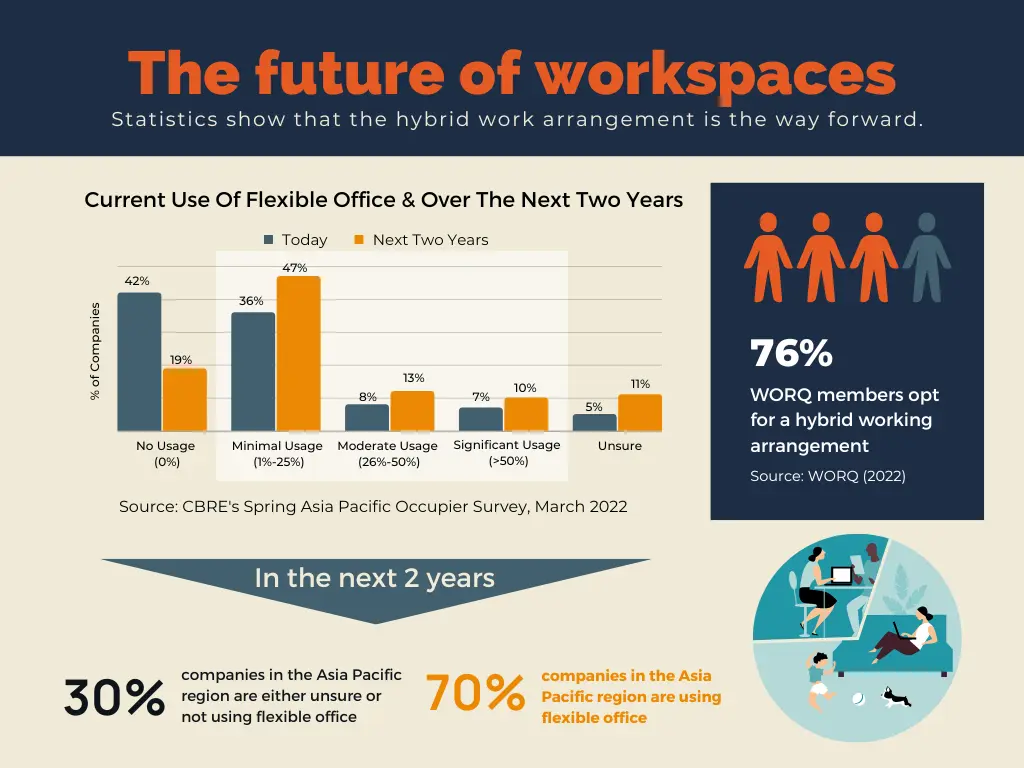As the pandemic enters its third year, businesses need to consider how to adapt their
operations to the new normal. Companies in Asia-Pacific have been forced to adjust their
employees to flexible scheduling and react swiftly to changes in the market and consumer
demand. As a result, flexible offices are predicted to increase in demand. The real question is:
can flexible offices create a balance between increased productivity and future expansion
needs?
Increased use of flexible office space in the future
According to the CBRE Spring 2022 Asia Pacific Occupier Survey, flexible offices or coworking
spaces will become more popular in the upcoming years.
Participants in the survey predict flexible office space adaptation in real estate portfolios will rise
to 17 percent by 2024, up from 7 percent in 2022. That makes up a total of 50 percent of
companies using flex offices.
Additionally, flexible office space providers must cater to the ever-increasing client demand.
They need to be able to expand the range of flexible office space options, from on-demand
event space to customised private offices.
According to CBRE (2022), tech companies will still be the primary users of flexible offices.
Meanwhile, other industries such as services, banking, retail, and life sciences sectors are
expected to use flexible offices in a far higher amount than before.
Looking at the primary driver, flexible office spaces are commonly used as a temporary solution
for alternative workspaces for employees. Coworking spaces are used to provide collaboration
space, on-demand meetings, and an increased staff location.
Hybrid work is the new normal

Although capital expenditure (CapEx) reductions continue to be a major factor driving demand
for flexible space, the main reason for flexible office adaptation is the remote working
arrangement.
90 out of 150 companies chose hybrid work instead of the traditional way as staff members can
divide their time between working from the office and at home (CBRE, 2022).
Aligning with the findings, WORQ – a leading coworking space and flexible office provider in
Malaysia, discovered that 76 percent of its members prefer a hybrid work arrangement.
Moreover, 51 percent of companies at WORQ support the idea of a hybrid working policy.
Methodology
The data is gathered from OfficeRnD to see the total days that 1,563 members and 469
companies visited WORQ in a span of two weeks from January to September 2022. People who
visit the office for four days or less after being filtered are categorised as hybrid workers.
Overcoming modern workplace challenges with flexibility
As workers demand working in hybrid environments, when businesses start working in the
office, things will change. Companies must adopt hybrid work as the new normal to increase
workplace flexibility.
Using coworking spaces is one way to adopt flexible working. According to data from CBRE
(2022), many organisations have switched to hot-desking – one of many coworking products, or
other flexible arrangements.
This trend has been growing since 2020. Only 28 percent of businesses still use fixed seating
arrangements as of 2022, far fewer than the 58 percent of businesses that used them before the
pandemic. This number is predicted to decrease significantly to 12 percent in two years.
IQI Global: A real estate partner offering flexibility
Among the companies that adopt hybrid work is IQI Global, a leading real estate partner that
adopts the latest technology for efficiency. The ideology of IQI Global is to promote flexible
working and focus on productivity.
At IQI, real estate negotiators (realtors) are equipped with the latest technology. For instance,
realtors can view what they have sold and the commission they have received on IQI Atlas.
There is also the IQI Academy, where a variety of training programmes are provided to upgrade
the realtors’ skills.
On top of that, the company offers its realtors the flexibility to work on their terms, be it to work
from home or hybrid work, which is a mix of working from home and in any shared workspace
such as coworking spaces. In addition to the vacation opportunities and networking perks, IQI
Global offers its agents a sophisticated training programme and a quick commission payout
mechanism.
In short, not only IQI Global gives the platform for realtors to unleash their potential, but it also
gives them the flexibility of hybrid work. What a convenient way to work!
WORQ: A flexible office provider supporting hybrid workers
With all the flexibility it offers, utilising coworking spaces is the most effective strategy to tackle
future workplace challenges. Real estate negotiators can also benefit from a coworking space
due to its flexibility to access any time and the productive community inside to enable them to
network. On top of that, through Enterprise Solutions, WORQ can build a flexible office for
businesses to scale up in the future and design and customise the workspace the way they
want it to be.
WORQ is opening its fifth outlet in KL Sentral. The office is certified with Leadership in Energy
and Environmental Design (LEED) and the Green Building Index (GBI), catering to the demand
for green buildings without paying the green premium.
At the end of the day, coworking spaces are the solution to easing the transition to hybrid work
and returning to work. Book a tour at WORQ to experience how flexibility can boost your
productivity and embrace the hybrid work trend!



